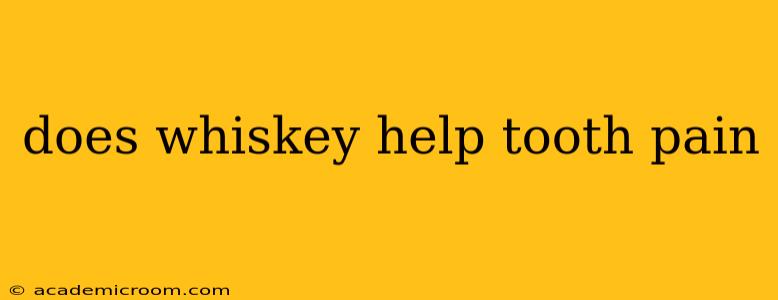Tooth pain is a universally unwelcome experience, often leading people to seek quick relief. While many swear by home remedies, it's crucial to understand the facts before resorting to unconventional methods like using whiskey for toothaches. This article explores the purported benefits of whiskey for tooth pain, delves into the potential risks, and ultimately recommends safer, more effective approaches.
Does whiskey numb tooth pain?
The numbing effect often associated with whiskey stems from its alcohol content. Alcohol has anesthetic properties, meaning it can temporarily desensitize the area where it's applied. However, this effect is temporary and mild at best. It's important to remember that whiskey is not a dental anesthetic and won't address the underlying cause of the toothache. The temporary numbing sensation might provide fleeting relief, but it won't treat the infection or inflammation causing the pain.
Is whiskey a good home remedy for toothaches?
No, whiskey is not a recommended home remedy for toothaches. While the temporary numbing effect might seem appealing, the risks far outweigh any potential benefit. Swishing whiskey around in your mouth exposes the sensitive tissues of your mouth to alcohol, potentially causing irritation and even burning. Furthermore, introducing alcohol into an already potentially infected area increases the risk of infection.
What are the dangers of using whiskey for a toothache?
The potential dangers of using whiskey for tooth pain are significant:
- Increased risk of infection: An open wound or infection in the mouth can easily be exacerbated by the introduction of alcohol. Alcohol can also irritate the gums and mucous membranes, hindering the healing process.
- Alcohol burn: The high alcohol content in whiskey can burn the sensitive tissues in your mouth, leading to further discomfort and potential damage.
- Delayed treatment: Relying on whiskey as a pain reliever can delay seeking professional dental care, potentially worsening the underlying condition and leading to more extensive and costly treatment later.
- Interaction with medications: If you are taking other medications, the alcohol in whiskey can interact negatively, creating unexpected side effects or reducing the efficacy of your medication.
What are better ways to treat a toothache?
Instead of resorting to potentially harmful remedies like whiskey, focus on proven and safe methods for managing tooth pain:
- Over-the-counter pain relievers: Ibuprofen or acetaminophen can help reduce pain and inflammation. Always follow the dosage instructions on the packaging.
- Saltwater rinse: A warm saltwater rinse can help clean the affected area and soothe inflammation.
- Cold compress: Applying a cold compress to the outside of your cheek can help numb the area and reduce swelling.
- Dental visit: The most crucial step is to schedule an appointment with your dentist as soon as possible. They can diagnose the underlying cause of your toothache and recommend appropriate treatment, which may include a filling, root canal, or extraction.
What causes tooth pain?
Tooth pain can stem from various sources, including:
- Cavities: Decay in the tooth structure leading to pain and sensitivity.
- Abscesses: Pus-filled pockets of infection near the tooth root.
- Gum disease (gingivitis or periodontitis): Inflammation and infection of the gums.
- Cracked or chipped tooth: A fracture in the tooth structure that exposes the nerve.
- Teeth grinding (bruxism): This can cause jaw pain and sensitivity in the teeth.
- Impacted wisdom teeth: Wisdom teeth that don't have enough room to erupt properly can cause pain and inflammation.
Addressing tooth pain effectively requires identifying its root cause. Avoid potentially harmful home remedies like whiskey and seek professional dental care for proper diagnosis and treatment. While the temporary numbing sensation might seem like a quick fix, it's crucial to prioritize your long-term oral health.
